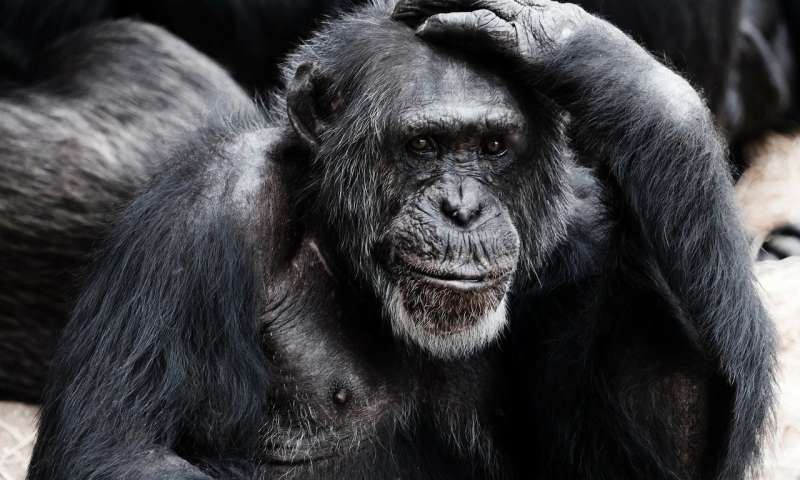Chimpanzees found to age in ways similar to humans

A team of researchers from the University of New Mexico and the Kibale Chimpanzee Project in Uganda has found similarities between the way chimpanzees and humans age. In their paper published in Proceedings of the National Academy of Sciences, the group describes their 20-year study of chimps living at Kibale National Park and what they learned about the ways they age.
Prior research has shown that as people age, they undergo changes to their hypothalamic-pituitary-adrenal (HPA) axis—a biological system that plays a major role in how people respond to stress. One of those ways is bumping up levels of cortisol production. Cortisol is a hormone that plays a role in regulating metabolism and blood pressure. Prior research has also shown that excess cortisol can lead to problems such as a reduction in clear thinking, a weakened immune system and inflammation—all symptoms of aging in humans. But now, it appears that chimpanzees undergo a similar process.
The work by the team was part of a large overall effort to study physical and behavioral traits of chimpanzees in a near-natural setting. As part of that effort, team members placed plastic bags in the trees where the chimps reside in the park to collect urine samples from 59 adults. The team has been collecting urine samples from the chimps for approximately 20 years. In analyzing its composition, the researchers have found that the chimps also experience elevated levels of cortisol as they grow older—and furthermore, the higher levels of the hormone could not be attributed to reproductive activity or social status. They claim the increased levels of cortisol suggest chimps age similarly to humans.
The researchers found that cortisol levels were highest in the males when they were making moves on sexually receptive females. They also found that cortisol levels were highest in the females when they were sexually receptive—a time when females are under stress from competing males. They also suggest that rising cortisol levels in hominids are an ancient attribute, and are thus not a byproduct of aging.
More information: Melissa Emery Thompson et al. Wild chimpanzees exhibit humanlike aging of glucocorticoid regulation, Proceedings of the National Academy of Sciences (2020). DOI: 10.1073/pnas.1920593117
No comments:
Post a Comment